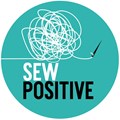Story
Our peer-support volunteer leaders:
Sew Positive participants Adam and Zamina, are setting up a new weekly volunteer-led knitting and crochet peer-support group for people facing social isolation and mental health issues, as a Sew Positive service. We need to raise funding for venue hire, insurance, training, running costs and materials.
Adam Cleevely is a participant in our Men's Hems programme and a well-known presence on social media as a passionate knitter. He brings not only his creative skills but also a strong sense of peer support to the Sew Positive community, helping others learn and grow in a safe, welcoming environment.
Previously a COO and CEO of several companies and now a consultant, Adam now spend more time focussing on sharing the therapeutic benefits of knitting and craft. He also brings valuable lived experience, having navigated periods of challenging mental health himself. Adam and Zamina are both undertaking training which includes training to be a Mental Health First Aider with our charity, and the sessions will be supported by Sew Positive volunteers and staff.
Adam said: "Knitting with others helps my mental health by offering calm, connection, and slow, meaningful progress which is why I’m passionate about teaching it in a supportive group for others who are struggle".
Zamina said "Life can be incredibly tough at times. I’ve always considered myself a strong-willed and confident person—mentally one of the strongest in my circle. But recently, life has tested me in ways I didn’t expect. From supporting my son through serious mental health struggles, and dealing with challenges at home with my sister and nephew having cancer - it’s been overwhelming. My confidence has been shaken. Sew Positive has become my sanctuary—my mental escape and a place of healing. It’s reminded me of who I truly am, and reconnected me to a special part of my identity: a tailor’s daughter. Being here has brought back cherished memories of watching my father at his sewing machine, working hard and caring for me as a devoted single parent."
Why is this important - the research!
A 2025 study found that participants who engaged in creative practices rooted in their heritage, like traditional crafts, reported feeling less anxious and more emotionally balanced compared to those completing puzzles with a clear end goal. The key difference was that the creative activities were not focused on finishing a task, but rather about being present in the process.
Knitting and crochet challenge the idea that time must always be optimised. They remind you that time spent doing something slow, quiet and meaningful is not wasted; rather, it is restorative. It’s a way of choosing presence over pressure and imagination over efficiency. In a world wired for hustle, that choice becomes a radical act of self-respect.
The cherry on top is that you end up with something tangible like a scarf, jumper or gift for a friend, which you can hold and cherish as a product of your presence, and patience that brings you quiet satisfaction.
The act of doing something slowly and mindfully becomes your quiet rebellion against a world that insists on constant speed and output.
Knitting boosts your cognitive health!
Incorporating simple, traditional hobbies into your daily routine can have a profound impact on your cognitive health. While these activities may seem outdated or simplistic, they play a critical role in maintaining brain function and cognitive resilience.
Research shows that a diverse range of activities is linked to improved brain health, particularly in areas related to memory, learning and spatial navigation. Researchers found that engaging in varied activities can lead to greater hippocampal volume, which is crucial for cognitive functions like memory retention and spatial reasoning. The hippocampus benefits from activities that require sustained focus, learning and creativity — characteristics inherent in many traditional hobbies.
Reintroducing traditional hobbies and learning new skills can significantly boost cognitive health. These activities engage the brain in multiple ways, from improving memory and motor skills to enhancing spatial awareness and problem-solving abilities.
Manual tasks like knitting and sewing require focus, dexterity and memory, while encouraging mental engagement through planning and tracking progress.
 Campaign by
Campaign by 